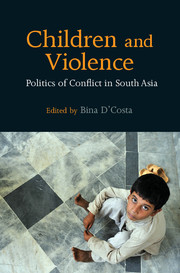Book contents
- Frontmatter
- Dedication
- Contents
- List of Map, Figures and Tables
- Acknowledgements
- Introduction: ‘Turtles Can Fly’: Vicarious Terror and the Child in South Asia
- Part I Shaping Childhood in South Asia
- Part II Conflict and Violent Peace
- 4 Migration, Mobilization, and Memory: The Sri Lankan Civil War in the Lives of Tamil Youth
- 5 Politics of the Orphans of War: 72 Children's Journey from the Chittagong Hill Tracts of Bangladesh to the Suburbs of France
- 6 Besieged Childhood and Broken Dreams: Failed Promises of the State and Maoist Movement in India
- 7 Impacts of Terrorism on Children in Pakistan: A Case Study of Displaced Children in Khyber Pakhtunkhwa
- Part III Rights, Needs and Protection
- Part IV Reflections from Human Rights Advocates in the Region
- Bibliography
- Notes on Contributors
- Index
4 - Migration, Mobilization, and Memory: The Sri Lankan Civil War in the Lives of Tamil Youth
from Part II - Conflict and Violent Peace
Published online by Cambridge University Press: 05 June 2016
- Frontmatter
- Dedication
- Contents
- List of Map, Figures and Tables
- Acknowledgements
- Introduction: ‘Turtles Can Fly’: Vicarious Terror and the Child in South Asia
- Part I Shaping Childhood in South Asia
- Part II Conflict and Violent Peace
- 4 Migration, Mobilization, and Memory: The Sri Lankan Civil War in the Lives of Tamil Youth
- 5 Politics of the Orphans of War: 72 Children's Journey from the Chittagong Hill Tracts of Bangladesh to the Suburbs of France
- 6 Besieged Childhood and Broken Dreams: Failed Promises of the State and Maoist Movement in India
- 7 Impacts of Terrorism on Children in Pakistan: A Case Study of Displaced Children in Khyber Pakhtunkhwa
- Part III Rights, Needs and Protection
- Part IV Reflections from Human Rights Advocates in the Region
- Bibliography
- Notes on Contributors
- Index
Summary
‘We shot them, threw away our guns, and ran.’ Niroshan's statement hung in the air for a while. He reflected on it, and then smiled. When Amarasingam, one of the authors of this chapter, spoke with Niroshan in 2013, he insisted that his life was now at peace. He had been forcibly recruited by the LTTE, or Tamil Tigers in the final months of the protracted civil war in Sri Lanka, which came to an end in May 2009. The Tigers, in the final months, had begun forcibly recruiting individuals indiscriminately, and Niroshan, aged 16 at the time, found himself given only a few days of training before being taken to the frontlines. Many of these recruits, however, were more interested in fleeing with their lives than dying for the cause of national liberation – and Niroshan was no different. Hours after being taken to the frontlines, he hatched a scheme with another like-minded youth, deciding to flee when the opportunity presented itself. The Tigers’ leadership, accustomed to having many of these new recruits vanish from their clutches, had installed ‘watchers’ to ensure that they continued fighting. Niroshan and his friend waited until two of these watchers became distracted, and then shot them dead. He reflects on it now and harbours no guilt about the killings because he feels he had no choice. He missed his family, with whom he had lost contact in the confusion of war, and wanted to be reunited with them – not fight and die for a cause he was too young to understand.
The civil war in Sri Lanka was one of the most brutal conflicts in recent memory. The violence brought by the Sri Lankan military on Tamil civilians in the North and East of the country, and the violence brought by the LTTE on Sinhala and Muslims populations in the North and South, has devastated Sri Lankan society. Very few will deny that the end of war is a good thing for the country. However, the golden opportunity that existed for peace, justice, and reconciliation has largely been squandered by the Rajapaksa government, abetting more cracks to emerge on pre-existing fault-lines.
- Type
- Chapter
- Information
- Children and ViolencePolitics of Conflict in South Asia, pp. 107 - 131Publisher: Cambridge University PressPrint publication year: 2016



